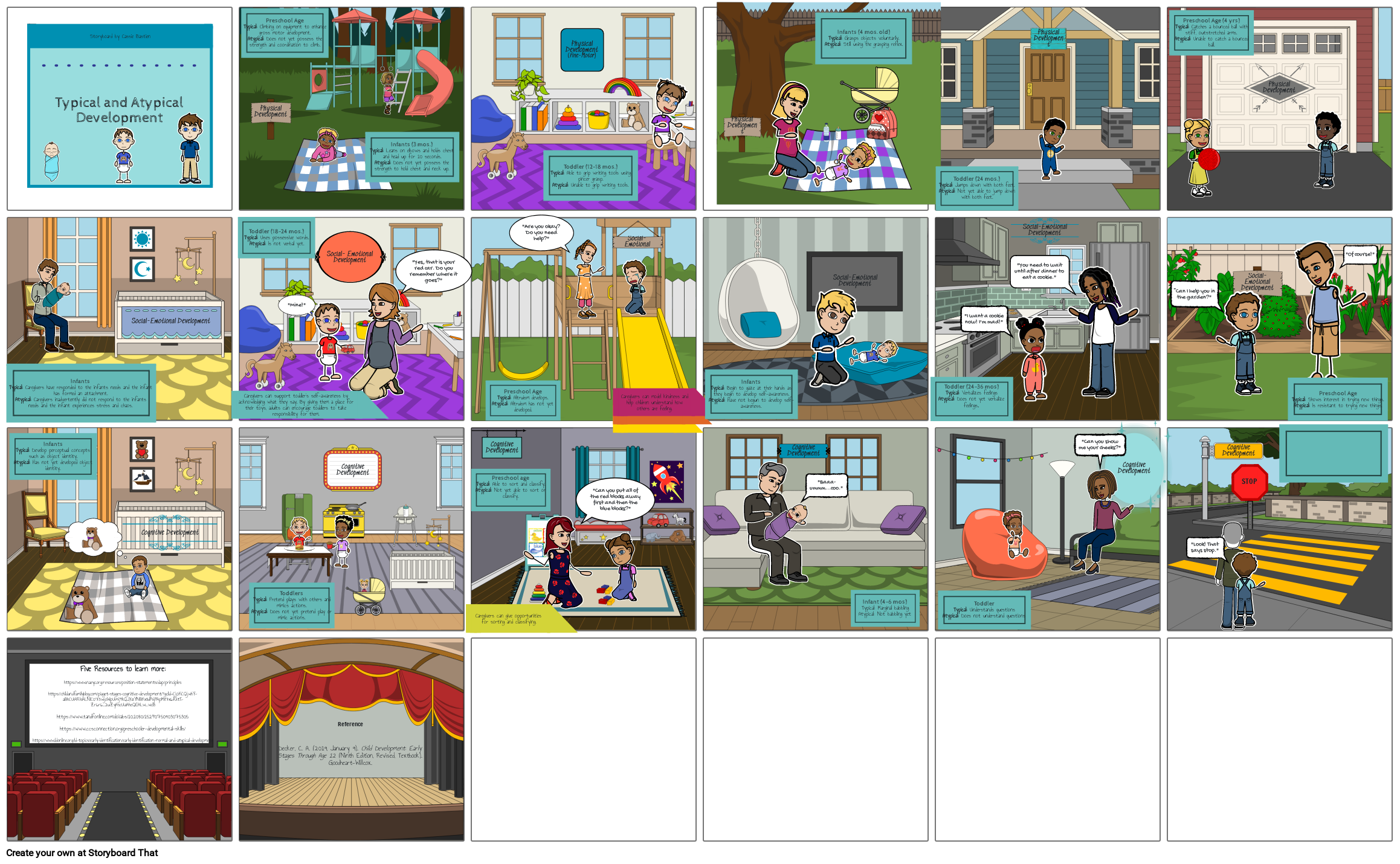Typical and Atypical Development

Storyboard Text
- Storyboard by Cassie Bastien Typical and Atypical Development
- Preschool AgeTypical: Climbing on equipment to enhance gross motor development.Atypical: Does not yet possess the strength and coordination to climb.
- Physical Development
- Infants (3 mos.)Typical: Leans on elbows and holds chest and head up for 10 seconds.Atypical: Does not yet possess the strength to hold chest and neck up.
- Toddler (12-18 mos.)Typical: Able to grip writing tools using pincer grasp.Atypical: Unable to grip writing tools.
- Physical Development (Fine-Motor)
- Physical Development
- Infants (4 mos. old)Typical: Grasps objects voluntarily.Atypical: Still using the grasping reflex.
- Toddler (24 mos.)Typical: Jumps down with both feet.Atypical: Not yet able to jump down with both feet.
- Physical Development
- Preschool Age (4 yrs)Typical: Catches a bounced ball with stiff, outstretched arms.Atypical: Unable to catch a bounced ball.
- Physical Development
- InfantsTypical: Caregivers have responded to the infants needs and the infant has formed an attachment.Atypical: Caregivers inadvertently did not respond to the infants needs and the infant experiences stress and chaos.
- Social-Emotional Development
- Caregivers can support toddler's self-awareness by acknowledging what they say. By giving them a place for their toys, adults can encourage toddlers to take responsibility for them.
- Toddler (18-24 mos.)Typical: Uses possessive words.Atypical: Is not verbal yet.
- Mine!
- Social- Emotional Development
- Yes, that is your red car. Do you remember where it goes?
- Preschool AgeTypical: Altruism develops.Atypical: Altruism has not yet developed.
- Are you okay? Do you need help?
- Social-Emotional
- Caregivers can model kindness and help children understand how others are feeling.
- InfantsTypical: Begin to gaze at their hands as they begin to develop self-awareness.Atypical: Have not begun to develop self-awareness.
- Social-Emotional Development
- Toddler (24-36 mos)Typical: Verbalizes feelingsAtypical: Does not yet verbalize feelings.
- I want a cookie now! I'm mad!
- You need to wait until after dinner to eat a cookie.
- Social-Emotional Development
- Cognitive Development
- Can I help you in the garden?
- Social-Emotional Development
- Preschool AgeTypical: Shows interest in trying new things.Atypical: Is resistant to trying new things.
- Of course!
- InfantsTypical: Develop perceptual concepts such as object identity.Atypical: Has not yet developed object identity.
- .....
- Cognitive Development
- ToddlersTypical: Pretend plays with others and mimics actions.Atypical: Does not yet pretend play or mimic actions.
- Cognitive Development
- Caregivers can give opportunities for sorting and classifying.
- Preschool ageTypical: Able to sort and classify.Atypical: Not yet able to sort or classify.
- Cognitive Development
- Can you put all of the red blocks away first and then the blue blocks?
- Cognitive Development
- Baaa-ummm...coo.
- Infant (4-6 mos)Typical: Marginal babblingAtypical: Not babbling yet
- ToddlerTypical: Understands questionsAtypical: Does not understand questions
- Can you show me your cheeks?
- Look! That says stop.
- Cognitive Development
- STOP
- Five Resources to learn more:https://www.naeyc.org/resources/position-statements/dap/principleshttps://childandfamilyblog.com/piaget-stages-cognitive-development/?gclid=Cj0KCQjwhY-aBhCUARIsALNIC073wjoWpUmj4kQJXzYNBKx8dPsjPApM87x6fUtT-Zr6r6_2uZyAscUaAheQEALw_wcBhttps://www.tandfonline.com/doi/abs/10.1080/15240750903075305https://www.ccsconnection.org/preschooler-developmental-skills/https://www.ldonline.org/ld-topics/early-identification/early-identification-normal-and-atypical-development
- ReferenceDecker, C. A. (2019, January 9). Child Development: Early Stages Through Age 12 (Ninth Edition, Revised, Textbook). Goodheart-Willcox.
Over 30 Million Storyboards Created

